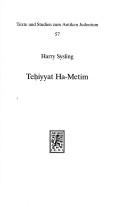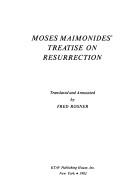| Listing 1 - 10 of 24 | << page >> |
Sort by
|

ISBN: 3161465830 9783161465833 Year: 1996 Publisher: Tübingen: Mohr,
Abstract | Keywords | Export | Availability | Bookmark
 Loading...
Loading...Choose an application
- Reference Manager
- EndNote
- RefWorks (Direct export to RefWorks)
Book
ISBN: 9780300136357 0300136358 Year: 2008 Publisher: New Haven: Yale university press,
Abstract | Keywords | Export | Availability | Bookmark
 Loading...
Loading...Choose an application
- Reference Manager
- EndNote
- RefWorks (Direct export to RefWorks)
This provocative volume explores the origins of the Jewish doctrine of the resurrection of the dead. Jon D. Levenson argues that, contrary to a very widespread misconception, the ancient rabbis were keenly committed to the belief that at the end of time, God would restore the deserving dead to life. In fact, Levenson points out, the rabbis saw the Hebrew Bible itself as committed to that idea.The author meticulously traces the belief in resurrection backward from its undoubted attestations in rabbinic literature and in the Book of Daniel, showing where the belief stands in continuity with earlier Israelite culture and where it departs from that culture. Focusing on the biblical roots of resurrection, Levenson challenges the notion that it was a foreign import into Judaism, and in the process he develops a neglected continuity between Judaism and Christianity. His book will shake the thinking of scholars and lay readers alike, revising the way we understand the history of Jewish ideas about life, death, and the destiny of the Jewish people.

ISBN: 0870687646 Year: 1982 Publisher: New York (N.Y.): KTAV
Abstract | Keywords | Export | Availability | Bookmark
 Loading...
Loading...Choose an application
- Reference Manager
- EndNote
- RefWorks (Direct export to RefWorks)
Book
Year: 1636 Publisher: Amstelodami: typis & sumptibus auctoris,
Abstract | Keywords | Export | Availability | Bookmark
 Loading...
Loading...Choose an application
- Reference Manager
- EndNote
- RefWorks (Direct export to RefWorks)
Book
ISBN: 3429014271 Year: 1992 Publisher: Würzburg Echter
Abstract | Keywords | Export | Availability | Bookmark
 Loading...
Loading...Choose an application
- Reference Manager
- EndNote
- RefWorks (Direct export to RefWorks)
Resurrection (Jewish theology) --- Resurrection --- Biblical teaching
Book
ISBN: 3161587405 Year: 1996 Publisher: Tübingen, Germany : J.C.B. Mohr (Paul Siebeck),
Abstract | Keywords | Export | Availability | Bookmark
 Loading...
Loading...Choose an application
- Reference Manager
- EndNote
- RefWorks (Direct export to RefWorks)
Max J. Lee untersucht die Philosophien des Platonismus und Stoizismus während der griechisch-römischen Ära und deren Konkurrenzprogramme daraufhin, wie man die Persönlichkeit eines Menschen vom Laster zur Tugend wandelt. Er zeigt, dass emotionale Kontrolle, ethisches Handeln und Gewohnheit, Charakteranlage, Rat und Gottheit alle zur Moralbildung einer Person beitragen.
Resurrection (Jewish theology) --- Auferstehung --- Antike --- Altes Testament
Book
ISBN: 9781532601354 9781532601378 9781532601361 Year: 2017 Publisher: Eugene, OR Pickwick Publications
Abstract | Keywords | Export | Availability | Bookmark
 Loading...
Loading...Choose an application
- Reference Manager
- EndNote
- RefWorks (Direct export to RefWorks)
Jesus Christ --- Jesus Christ --- Resurrection (Jewish theology) --- Jewish interpretations --- Resurrection
Book
ISBN: 080662020X Year: 1983 Publisher: Minneapolis (Minn.): Augsburg publ. house
Abstract | Keywords | Export | Availability | Bookmark
 Loading...
Loading...Choose an application
- Reference Manager
- EndNote
- RefWorks (Direct export to RefWorks)
Resurrection (Jewish theology) --- Jesus Christ --- Jesus Christ --- Jewish interpretations. --- Resurrection.
Book
ISBN: 0567700631 9780567700636 Year: 2021 Publisher: London: T&T Clark International,
Abstract | Keywords | Export | Availability | Bookmark
 Loading...
Loading...Choose an application
- Reference Manager
- EndNote
- RefWorks (Direct export to RefWorks)
"Sigvartsen examines the immense interest in life after death, and speculation about the fates awaiting both the righteous and the wicked that proliferated in the Second Temple period. In this volume Sigvartsen systematically examines the apocalyptic writings within the apocrypha, and identifies the numerous afterlife and resurrection beliefs that these texts present. He analyses these beliefs, enabling readers to easily understand and compare the wide-ranging beliefs on afterlife that these texts hold. A careful reading of various resurrection passages reveals that most of the distinct views on life-after-death, regardless of their complexity, show little evidence of systematic development relational to one another, and are often supported by several key passages or shared motifs from texts that later became a part of the TaNaKh. In addition, Sigvartsen also highlights the factors that may also have influenced the development of so many different resurrection beliefs; including anthropology, the nature of the soul, the scope of the resurrection, the number and function of judgments, and the final destination of the righteous and the wicked. This study provides a better understanding of how the TaNaKh was read by different communities during this important period, and the role it played in the development of the resurrection belief - a central article of faith in both Christianity and Rabbinic Judaism. The volume is a companion to Sigvartsen's other volume on these themes in the Pseudepigrapha."--Provided by publisher.
Apocryphal books (Old Testament) --- Future life --- Future life --- Resurrection --- Resurrection (Jewish theology) --- Eschatology --- Apocalyptic literature
Book
ISBN: 9780567700599 0567700593 Year: 2021 Publisher: London: T&T Clark International,
Abstract | Keywords | Export | Availability | Bookmark
 Loading...
Loading...Choose an application
- Reference Manager
- EndNote
- RefWorks (Direct export to RefWorks)
Apocryphal books (Old Testament) --- Future life --- Future life --- Resurrection --- Resurrection (Jewish theology) --- Eschatology --- Apocryphal books
| Listing 1 - 10 of 24 | << page >> |
Sort by
|

 Search
Search Feedback
Feedback About UniCat
About UniCat  Help
Help News
News